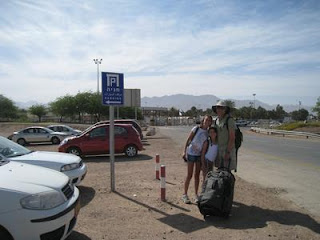A couple weeks ago (May 20-23) we went to Jordan. It was surprisingly easy to get there: a two-hour drive to Eilat, including a stop at Yotvata dairy for their famous chocolate milk. Rebekah, Jay and Miriam think it makes a good breakfast.

We parked the car and walked across the border.
 |
| You can see how close it is from our car to the border, background |
There’s a sign that clearly prohibits photography, but I saw other people with cameras, so I asked the guard on the Israeli side. “Photos aren’t allowed, but people do,” she said, with what I have come to recognize as typical Israeli respect for rules.
 |
| Walking from Israel to Jordan |
Crossing the border was uneventful except for one thing: they cancelled our visas which we had just been granted a few weeks earlier.
All US citizens automatically are granted 3-month visas. Because we are going to be in Israel for 6 months, we had to get a 3-month extension. In theory, we could have left the country and come back, getting a new 3-month visa, but given the current instability in the region, we didn’t want to count on that.
Instead, we entered the maze of Israeli bureaucracy. We worried, having heard stories from friends worthy of old-style USSR treatment, waiting for hours, only to be turned away for using the wrong color ink and told to come back tomorrow. We were very fortunate to have our friend Raz, head of tourism for Ramat Negev, as our guide in this process.
He scheduled a day for us to go to Beer Sheva. His office had called ahead and gotten us the forms to fill out. He also had a letter explaining how we are part of Partnership 2000, the first of many exchange families between Ramat Negev and Colorado, designed to bring American Jews to Israel to deepen US-Israeli understanding, etc, etc.
On the appointed day, we met Raz in our town and drove into Beer Sheva, the closest big city, about 45 minutes away. We were to be there at 8 am. We left in plenty of time and were making good time, until suddenly we were going 10 mph behind six tractors in the road. Raz said they shouldn’t be there, even called the police to report the “shesh traktorim b’derech.”
We finally made it to Beer Sheva and were through the metal detectors and in to the visa office by 8:20. Too late. I didn't understand completely, but think they give out numbers until 8:05. After that, you're out of luck. A dispute between Raz and the woman behind the desk, complete with explanation (shesh traktorim b’derech!) . He returned, with a big grin and a number. We waited for a bit over an hour until our number was called, then went up to the desk. The woman looked at us and another dispute ensued. Evidently Raz had answered her question of how many people we were correctly, 2, but omitted that we were there for 4 visas. Had she known, she wouldn’t have given us a number. Outmanoevered, she went over the forms, had us fill out some more, made a great show of how much work it was to staple our pictures to the applications, and finally put everything in a pile with Raz’s letter on top. She sent us home, told us to wait for a call.
No one called, but Raz checked and finally we were told to come back on the day our visas expired. We did, by ourselves this time. We weren’t sure exactly which building it was and first mistakenly tried to enter the mall next door. The security guard was very friendly and told us, in perfect English, to go one door down. It was still a few minutes before 8, so we waited with a group of people, about in the middle of the pack. The doors opened promptly at 8. Jay and I, 3 months into our trip, obviously haven’t learned even the most basic skills necessary for navigating in a country where the concept of a line is a joke. We were the last ones through.
This time, we did get a number. When we got to the desk, we found that the dour immigration official, whose job it is to deal with immigrants, spoke very little English. We thought perhaps she should change jobs with the mall security guy. She did, however, go laboriously over all the information they’d had on the forms for the past 3 weeks and slowly print out the visas. We left, quite pleased with ourselves.
So, imagine our surprise when, not even three weeks later, at the border, our passports were handed back to us looking like this:
 |
We asked why, and were told it had to be that way. We’d get new visas coming back. They didn’t know if they would be for long enough (we would need a little over two months) or not. They might be for three months, or they might be for one. Have a nice trip.
Four days later, we were headed back to Israel. We handed our passports to immigration and hoped for the best. The first one went very smoothly. “Great!” Jay said, standing behind the counter, “3 months, no problem!” I kicked him, hoping he hadn’t given us a kenahora (Yiddish word for evil eye, or jinx). Sure enough, “Let me have that passport back,” the woman behind the counter asked. Reluctantly, Jay slid it back. She hadn’t noticed the cancelled visas, but now had to check into them. After consulting with several co-workers, she decided they’d been cancelled in error. Who did that? Eilat border control? Couldn’t be. In the end, they decided we weren’t responsible for the error and issued the standard 3-month visas. Welcome back to Israel!
No comments:
Post a Comment